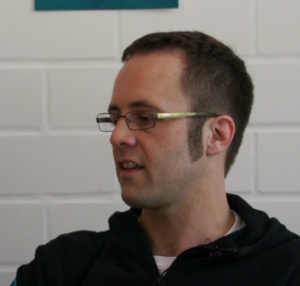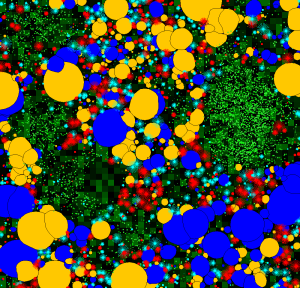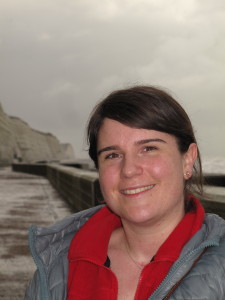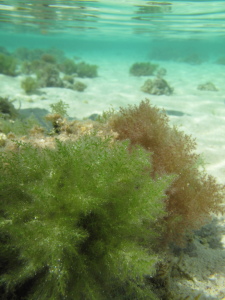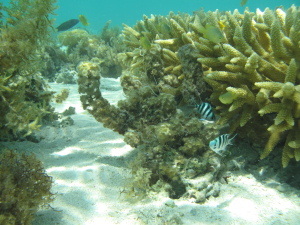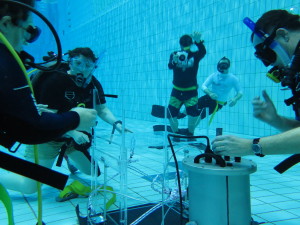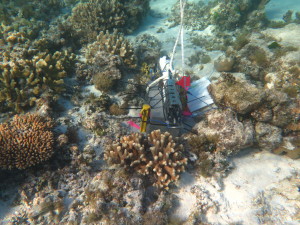Honorary Associate Professor
Faculty of Science
Affiliate Associate Professor
Global Change Institute
Email: sophie@uq.edu.au
Phone: +61 7 336 57229
Overview
Photobiology of isolated reefs and their ability to withstand a range of future climate scenarios
1) Photobiology of corals – How do host and symbiont interact to provide a highly efficient autotrophic organism that is able to export energy and thereby maintain Coral Reef growth despite high rate of erosion and minimal energy importation? Are some symbionts hosted by corals more parasitic than others – translocating less energy to their hosts? Do some corals cannibalize asexually produced polyps in the interest of promoting genet survival?
2) Effects of elevated temperature and acidification on coral physiology – What alterations do corals undergo on a seasonal basis under elevated temperatures that fall within their Q10 coping range? How do these alterations differ from the effects of temperature above this range? When does bleaching shift from a controlled response that is beneficial for holobiont performance to a detrimental uncontrolled response that leads to “genet” mortality? What are the interactive effects of elevated temperature and atmospheric CO2 on coral physiology?
3) How does climate change affect the productivity of coral reefs? It has been argued that future reefs will be dominated by algae, yet the responses of many algae to a range of projected future climate scenarios has not been fully evaluated. Who will be the winners in the future and will they be able to sustain the large biomass of primary and secondary consumers that currently exist on Reefs?
4) Carbon flow within the coral-dinoflagellate symbiosis and its role in maintaining cellular homeostasis. Estimating rates of carbon fixation and translocation; identifying resultant metabolites; and relating these to cellular processes and cell fates.
5) To what extent are reef-building corals heterotrophic? Are clade D corals more dependent on heterotrophy than other corals? Can symbionts fed on corals taking up organic carbon in addition to inorganic nutrients?
6) How is the balance between reef accretion and erosion affected by the various temperature and acidification scenarios proposed for the end of the century?
Qualifications
PhD Biological Sciences, The University of Sydney
MA Philosophy, University of Southern California
MA (Hons) Maths and Philosophy, University of Edinburgh
Publications
Book Chapter
Primary Production, Nutrient Recycling and Energy Flow through Coral Reef Ecosystems
Hoegh-Guldberg, Ove and Dove, Sophia Gwendoline (2008). Primary Production, Nutrient Recycling and Energy Flow through Coral Reef Ecosystems. In Patricia Hutchins, Ove Hoegh-Guldberg and Michael John Kingsford (Ed.), The Great Barrier Reef: Biology, Environment and Management (pp. 59-73) Collingwood, Victoria: CSIRO Publishing.
Vulnerability of reef-building corals on the Great Barrier Reef to climate change
Hoegh-Guldberg, O., Anthony, K., Berkelmans, R., Dove, S., Fabricus, K., Lough, J., Marshall, P., van Oppen, M. J. H., Negri, A. and Willis, B. (2007). Vulnerability of reef-building corals on the Great Barrier Reef to climate change. In Johnson, J. E. and Marshall, P. A. (Ed.), Climate Change and the Great Barrier Reef: A Vulnerability Assessment (pp. 271-308) Townsville, Queensland: Great Barrier Reef Marine Park Authority and The Australian Greenhouse Office.
The Cell Physiology of Coral Bleaching
Dove, G. and Hoegh-Guldberg, I O (2006). The Cell Physiology of Coral Bleaching. In Jonathan T. Phinney, Ove Hoegh-Guldberg, Joanie Kleypas and William Skirving and Al Strong (Ed.), Coral Reefs and Climate Change: Science and Management (pp. 55-71) Washington, DC: American Geophysical Union.
Journal Article
Unfolding the secrets of coral-algal symbiosis
Rosic, Nedeljka, Ling, Edmund Yew Siang, Chan, Chon-Kit Kenneth, Lee, Chin Hong, Kaniewska, Paulina, Edwards, David, Dove, Sophia and Hoegh-Guldberg, Ian Ove (2014) Unfolding the secrets of coral-algal symbiosis. The ISME Journal, . doi:10.1038/ismej.2014.182
Relative roles of endolithic algae and carbonate chemistry variability in the skeletal dissolution of crustose coralline algae
Reyes-Nivia, C., Diaz-Pulido, G. and Dove, S. (2014) Relative roles of endolithic algae and carbonate chemistry variability in the skeletal dissolution of crustose coralline algae. Biogeosciences, 11 17: 4615-4626.
Effects of ocean warming and acidification on the energy budget of an excavating sponge
Fang, James K. H., Schönberg, Christine H. L., Mello-Athayde, Matheus A., Hoegh-Guldberg, Ove and Dove, Sophie (2014) Effects of ocean warming and acidification on the energy budget of an excavating sponge. Global Change Biology, 20 4: 1-12.
The impact of CO2 emission scenarios and nutrient enrichment on a common coral reef macroalga is modified by temporal effects
Bender D., Diaz-Pulido G. and Dove S. (2014) The impact of CO2 emission scenarios and nutrient enrichment on a common coral reef macroalga is modified by temporal effects. Journal of Phycology, 50 1: 203-215.
Sponge biomass and bioerosion rates increase under ocean warming and acidification
Fang, James K. H., Mello-Athayde, Matheus A., Schonberg, Christine H. L., Kline, David I., Hoegh-Guldberg, Ove and Dove, Sophie (2013) Sponge biomass and bioerosion rates increase under ocean warming and acidification. Global Change Biology, 19 12: 3581-3591.
Future reef decalcification under a business-as-usual CO2 emission scenario
Dove, Sophie G., Kline, David I., Pantos, Olga, Angly, Florent E., Tyson, Gene W. and Hoegh-Guldberg, Ove (2013) Future reef decalcification under a business-as-usual CO2 emission scenario. Proceedings of the National Academy of Sciences of the United States of America, 110 38: 15342-15347.
Methods to quantify components of the excavating sponge Cliona orientalis Thiele, 1900
Fang, James K. H., Schonberg, Christine H. L., Kline, David I., Hoegh-Guldberg, Ove and Dove, Sophie (2013) Methods to quantify components of the excavating sponge Cliona orientalis Thiele, 1900. Marine Ecology, 34 2: 193-206.
Ocean acidification and warming scenarios increase microbioerosion of coral skeletons
Reyes-Nivia, Catalina, Diaz-Pulido, Guillermo, Kline, David, Guldberg, Ove-Hoegh and Dove, Sophie (2013) Ocean acidification and warming scenarios increase microbioerosion of coral skeletons. Global Change Biology, 19 6: 1919-1929.
New-old hemoglobin-like proteins of symbiotic dinoflagellates
Rosic, Nedeljka N., Leggat, William, Kaniewska, Paulina, Dove, Sophie and Hoegh-Guldberg, Ove (2013) New-old hemoglobin-like proteins of symbiotic dinoflagellates. Ecology and Evolution, 3 4: 822-834.
Effects of macroalgae on corals recovering from disturbance
Bender, Dorothea, Diaz-Pulido, Guillermo and Dove, Sophie (2012) Effects of macroalgae on corals recovering from disturbance. Journal of Experimental Marine Biology and Ecology, 429 15-19.
Thermal priming affects symbiont photosynthesis but does not alter bleaching susceptibility in Acropora millepora
Middlebrook, Rachael, Anthony, Kenneth R. N., Hoegh-Guldberg, Ove and Dove, Sophie (2012) Thermal priming affects symbiont photosynthesis but does not alter bleaching susceptibility in Acropora millepora. Journal of Experimental Marine Biology and Ecology, 432-433 64-72.
A lipidomic approach to understanding free fatty acid lipogenesis derived from dissolved inorganic carbon within cnidarian-dinoflagellate symbiosis
Dunn, Simon R., Thomas, Michael C., Nette, Geoffrey W. and Dove, Sophie G. (2012) A lipidomic approach to understanding free fatty acid lipogenesis derived from dissolved inorganic carbon within cnidarian-dinoflagellate symbiosis. PLoS One, 7 10 Article No.e46801: .
Decline in growth of foraminifer Marginopora rossi under eutrophication and ocean acidification scenarios
Reymond,Claire E., Lloyd, Alicia, Kline, David I., Dove, Sophie G. and Pandolfi, John M. (2012) Decline in growth of foraminifer Marginopora rossi under eutrophication and ocean acidification scenarios. Global Change Biology, 19 1: 291-302.
A single-cell view of ammonium assimilation in coral-dinoflagellate symbiosis
Pernice, Mathieu, Meibom, Anders, Van Den Heuvel, Annamieke, Kopp, Christophe, Domart-Coulon, Isabelle, Hoegh-Guldberg, Ove and Dove, Sophie (2012) A single-cell view of ammonium assimilation in coral-dinoflagellate symbiosis. Isme Journal, 6 7: 1314-1324.
Rapid identification of long-chain polyunsaturated fatty acids in a marine extract by HPLC-MS using data-dependent acquisition
Thomas, Michael C., Dunn, Simon R., Altvater, Jens, Dove, Sophie G. and Nette, Geoffrey W. (2012) Rapid identification of long-chain polyunsaturated fatty acids in a marine extract by HPLC-MS using data-dependent acquisition. Analytical Chemistry, 84 14: 5976-5983.
Thermal stress promotes host mitochondrial degradation in symbiotic cnidarians: are the batteries of the reef going to run out?
Dunn, Simon R., Pernice, Mathieu, Green, Kathryn, Hoegh-Guldberg, Ove and Dove, Sophie G. (2012) Thermal stress promotes host mitochondrial degradation in symbiotic cnidarians: are the batteries of the reef going to run out?. PloS One, 7 7: 39024.1-39024.14.
The effect of temperature stress on coral-Symbiodinium associations containing distinct symbiont types
Fisher, P. L., Malme, M. K. and Dove, S. (2012) The effect of temperature stress on coral-Symbiodinium associations containing distinct symbiont types. Coral Reefs, 31 2: 473-485.
A short-term in situ CO2 enrichment experiment on Heron Island (GBR)
Kline, David I., Teneva, Lida, Schneider, Kenneth, Miard, Thomas, Chai, Aaron, Marker, Malcolm, Headley, Kent, Opdyke, Brad, Nash, Merinda, Valetich, Matthew, Caves, Jeremy K., Russell, Bayden D., Connell, Sean D., Kirkwood, Bill J., Brewer, Peter, Peltzer, Edward, Silverman, Jack, Caldeira, Ken, Dunbar, Robert B., Koseff, Jeffrey R., Monismith, Stephen G., Mitchell, B. Greg, Dove, Sophie and Hoegh-Guldberg, Ove (2012) A short-term in situ CO2 enrichment experiment on Heron Island (GBR). Scientific Reports, 2 413.1-413.9.
Major cellular and physiological impacts of ocean acidification on a reef building coral
Kaniewska, Paulina, Campbell, Paul R., Kline, David I., Rodriguez-Lanetty, Mauricio, Miller, David J., Dove, Sophie and Hoegh-Guldberg, Ove (2012) Major cellular and physiological impacts of ocean acidification on a reef building coral. PLoS One, 7 4: e34659.1-e34659.12.
Interactions Between Ocean Acidification and Warming On the Mortality and Dissolution of Coralline Algae
Diaz-Pulido, Guillermo, Anthony, Kenneth R. N., Kline, David I., Dove, Sophie and Hoegh-Guldberg, Ove (2012) Interactions Between Ocean Acidification and Warming On the Mortality and Dissolution of Coralline Algae. Journal of Phycology, 48 1: 32-39.
The future of coral reefs
Hoegh-Guldberg, Ove, Ortiz, Juan Carlos and Dove, Sophie (2011) The future of coral reefs. Science, 334 6062: 1494-1495.
Mycosporine-like amino acids from coral dinoflagellates
Rosic, Nedeljka N. and Dove, Sophie (2011) Mycosporine-like amino acids from coral dinoflagellates. Applied and Environmental Microbiology, 77 24: 8478-8486.
Adaptive divergence in a scleractinian coral: physiological adaptation of Seriatopora hystrix to shallow and deep reef habitats
Bongaerts, Pim, Riginos, Cynthia, Hay, Kyra B., van Oppen, Madeleine J.H., Hoegh-Guldberg, Ove and Dove, Sophie (2011) Adaptive divergence in a scleractinian coral: physiological adaptation of Seriatopora hystrix to shallow and deep reef habitats. BMC Evolutionary Biology, 11 1: 1-46.
High CO2 enhances the competitive strength of seaweeds over corals
Diaz-Pulido, Guillermo, Gouezo, Marine, Tilbrook, Bronte, Dove, Sophie and Anthony, Kenneth R. N. (2011) High CO2 enhances the competitive strength of seaweeds over corals. Ecology Letters, 14 2: 156-162.
Regulation of apoptotic mediators reveals dynamic responses to thermal stress in the reef building coral Acropora millepora
Pernice, Mathieu, Dunn, Simon R., Miard, Thomas, Dufour, Sylvie, Dove, Sophie and Hoegh-Guldberg, Ove (2011) Regulation of apoptotic mediators reveals dynamic responses to thermal stress in the reef building coral Acropora millepora. PLoS One, 6 1: e16095.1-e16095.13.
Gene expression profiles of cytosolic heat shock proteins Hsp70 and Hsp90 from symbiotic dinoflagellates in response to thermal stress: Possible implications for coral bleaching
Rosic, Nedeljka N., Pernice, Mathieu, Dove, Sophie, Dunn, Simon and Hoegh-Guldberg, Ove (2011) Gene expression profiles of cytosolic heat shock proteins Hsp70 and Hsp90 from symbiotic dinoflagellates in response to thermal stress: Possible implications for coral bleaching. Cell Stress and Chaperones, 16 1: 69-80.
Differential regulation by heat stress of novel cytochrome P450 genes from the dinoflagellate symbionts of reef-building corals
Rosic, Nedeljka N., Pernice, Mathieu, Dunn, Simon, Dove, Sophia and Hoegh-Guldberg, Ove (2010) Differential regulation by heat stress of novel cytochrome P450 genes from the dinoflagellate symbionts of reef-building corals. Applied and Environmental Microbiology, 76 9: 2823-2829.
Heating rate and symbiont productivity are key factors determining thermal stress in the reef-building coral Acropora formosa
Middlebrook, Rachael, Anthony, Kenneth R.N., Hoegh-Guldberg, Ove and Dove, Sophie (2010) Heating rate and symbiont productivity are key factors determining thermal stress in the reef-building coral Acropora formosa. Journal of Experimental Biology, 213 7: 1026-1034.
The effect of ocean acidification on symbiont photorespiration and productivity in Acropora formosa
Crawley, Alicia, Kline, David I., Dunn, Simon, Anthony, Ken and Dove, Sophie (2010) The effect of ocean acidification on symbiont photorespiration and productivity in Acropora formosa. Global Change Biology, 16 2: 851-863.
Photoreactivation is the main repair pathway for UV-induced DNA damage in coral planulae
Reef, R, Dunn, S, Levy, O, Dove, S, Shemesh, E, Brickner, I, Leggat, W and Hoegh-Guldberg, O (2009) Photoreactivation is the main repair pathway for UV-induced DNA damage in coral planulae. Journal of Experimental Biology, 212 17: 2760-2766.
Doom and boom on a resilient reef: Climate change, algal overgrowth and coral recovery
Diaz-Pulido, Guillermo, McCook, Laurence J., Dove, Sophie, Berkelmans, Ray, Roff, George, Kline, David I., Weeks, Scarla, Evans, Richard D., Williamson, David H. and Hoegh-Guldberg, Ove (2009) Doom and boom on a resilient reef: Climate change, algal overgrowth and coral recovery. PLoS One, 4 4: e5239.1-e5239.9.
Mesenterial filaments make a clean sweep of substrates for coral growth
Roff, G., Dove, S. G. and Dunn, S. R. (2009) Mesenterial filaments make a clean sweep of substrates for coral growth. Coral Reefs, 28 1: 79-79.
Cohesive molecular genetic data delineate species diversity in the dinoflagellate genus Symbiodinium
Sampayo, EM, Dove, S and Lajeunesse, TC (2009) Cohesive molecular genetic data delineate species diversity in the dinoflagellate genus Symbiodinium. MOLECULAR ECOLOGY, 18 3: 500-519.
Ocean acidification causes bleaching and productivity loss in coral reef builders
Anthony, K. R. N., Kline, D. I., Diaz-Pulido, G., Dove, S. and Hoegh-Guldberg, O. (2008) Ocean acidification causes bleaching and productivity loss in coral reef builders. Proceedings of the National Academy of Sciences of the United States of America, 105 45: 17442-17446.
Host pigments: Potential facilitators of photosynthesis in coral symbioses
Dove, Sophie G., Lovell, Carli, Fine, Maoz, Deckenback, Jeffrey, Hoegh-Guldberg, Ove, Iglesias-Prieto, Roberto and Anthony, Kenneth R.N. (2008) Host pigments: Potential facilitators of photosynthesis in coral symbioses. Plant, Cell and Environment, 31 11: 1523-1533.
Analytical approach for selecting normalizing genes from a cDNA microarray platform to be used in q-RT-PCR assays: a cnidarian case study
Rodriguez-Lanetty, Mauricio, Phillips, Wendy S., Dove, Sophie, Hoegh-Guldberg, Ove and Weis, Virginia M. (2008) Analytical approach for selecting normalizing genes from a cDNA microarray platform to be used in q-RT-PCR assays: a cnidarian case study. Journal of Biochemical and Biophysical Methods, 70 6: 985-991.
Gene expression of a green fluorescent protein homolog as a host-specific biomarker of heat stress within a reef-building coral
Smith-Keune, C. and Dove, S. (2008) Gene expression of a green fluorescent protein homolog as a host-specific biomarker of heat stress within a reef-building coral. Marine Biotechnology, 10 2: 166-180.
Ultraviolet sunscreens in reef fish mucus
Eckes, M. J., Siebeck, U. E., Dove, S. G. and Grutter, A. S. (2008) Ultraviolet sunscreens in reef fish mucus. Marine Ecology Progress Series, 353 203-211.
Analysis of an EST library from the dinoflagellate (Symbiodinium sp.) symbiont of reef-building corals
Leggat, W., Hoegh-Guldberg, O., Dove, S. and Yellowlees, D. (2007) Analysis of an EST library from the dinoflagellate (Symbiodinium sp.) symbiont of reef-building corals. Journal of Phycology, 43 5: 1010-1021.
The hologenome theory disregards the coral holobiont
Leggat, William, Ainsworth, Tracy, Bythell, John, Dove, Sophie, Gates, Ruth, Hoegh-Guldberg, Ove, Iglesias-Prieto, Roberto and Yellowlees, David (2007) The hologenome theory disregards the coral holobiont. Nature Reviews Microbiology, 5 10: .
Niche partitioning of closely related symbiotic dinoflagellates
Sampayo, Eugenia M., Franceschinis, Lorenzo, Hoegh-Guldberg, Ove and Dove, Sophie (2007) Niche partitioning of closely related symbiotic dinoflagellates. Molecular Ecology, 16 17: 3721-3733.
A structural basis for the pH-dependent increase in fluorescence efficiency of chromoproteins
Battad, J. M., Wilmann, P. G., Olsen, S. C., Byres, E., Smith, S. C., Dove, S. G., Turcic, K. N., Devenish, R. J., Rossjohn, J. and Prescott, M. (2007) A structural basis for the pH-dependent increase in fluorescence efficiency of chromoproteins. Journal of Molecular Biology, 368 4: 998-1010.
The 2.0 angstrom crystal structure of a pocilloporin at pH 3.5: The structural basis for the linkage between color transition and halide binding
Wilmann, P. G., Battad, J., Beddoe, T., Olsen, S., Smith, S. C., Dove, S., Devenish, R. J., Rossjohn, J. and Prescott, M. (2006) The 2.0 angstrom crystal structure of a pocilloporin at pH 3.5: The structural basis for the linkage between color transition and halide binding. Photochemistry And Photobiology, 82 2: 359-366.
Aerial exposure influences bleaching patterns
Leggat, W, Ainsworth, TD, Dove, S and Hoegh-Guldberg, O (2006) Aerial exposure influences bleaching patterns. Coral Reefs, 25 3: 452-452.
Amino acid substitutions around the chromophore of the chromoprotein Rtms5 influence polypeptide cleavage
Turcic, Kristina, Pettikiriarachchi, Anne, Battad, Jion, Wilmann, Pascal G., Rossjohn, Jamie, Dove, Sophie G., Devenish, Rodney J. and Prescott, Mark (2006) Amino acid substitutions around the chromophore of the chromoprotein Rtms5 influence polypeptide cleavage. Biochemical And Biophysical Research Communications, 340 4: 1139-1143.
Physiological and genetic properties of two fluorescent colour morphs of the coral Montipora digitata
Klueter, A., Loh, W., Hoegh-Guldberg, O. and Dove, S. (2006) Physiological and genetic properties of two fluorescent colour morphs of the coral Montipora digitata. Symbiosis, 42 3: 123-134.
Response of holosymbiont pigments from the scleractinian coral Montipora monasteriata to short-term heat stress
Dove, Sophie, Ortiz, Juan Carlos, Enriquez, Susana, Fine, Maoz, Fisher, Paul, Iglesias-Prieto, Roberto, Thornhill, Dan and Hoegh-Guldberg, Ove (2006) Response of holosymbiont pigments from the scleractinian coral Montipora monasteriata to short-term heat stress. Limnology And Oceanography, 51 2: 1149-1158.
The 2.1 angstrom crystal structure of copGFP, a representative member of the copepod clade within the green fluorescent protein superfamily
Wilmann, P. G., Battad, J., Petersen, J., Wilce, M. C. J., Dove, S., Devenish, R. J., Prescott, M. and Rossjohn, J. (2006) The 2.1 angstrom crystal structure of copGFP, a representative member of the copepod clade within the green fluorescent protein superfamily. Journal of Molecular Biology, 359 4: 890-900.
Coral bleaching following wintry weather
Hoegh-Guldberg, O., Fine, M., Skirving, W., Johnstone, R., Dove, S. and Strong, A. (2005) Coral bleaching following wintry weather. Limnology And Oceanography, 50 1: 265-271.
Scleractinian corals with photoprotective host pigments are hypersensitive to thermal bleaching
Dove, S. (2004) Scleractinian corals with photoprotective host pigments are hypersensitive to thermal bleaching. Marine Ecology-progress Series, 272 99-116.
The 2.2 A crystal structure of a pocilloporin pigment reveals a nonplanar chromophore conformation
Prescott, M., Ling, M., Beddoe, T., Oakley, A. J., Dove, S., Hoegh-Guldberg, O., Devenish, R. J. and Rossjohn, J. (2003) The 2.2 A crystal structure of a pocilloporin pigment reveals a nonplanar chromophore conformation. Structure, 11 3: 275-284.
The production, purification and crystallization of a pocilloporin pigment from a reef-forming coral
Beddoe, T., Ling, M., Dove, S., Hoegh-Guldberg, O., Devenish, R. J., Prescott, M. and Rossjohn, J. (2003) The production, purification and crystallization of a pocilloporin pigment from a reef-forming coral. Acta Crystallographica Section D-biological Crystallography, 59 3: 597-599.
Major colour patterns of reef-building corals are due to a family of GFP-like proteins
Dove, S. G., Hoegh-Guldberg, O. and Ranganathan, S. (2001) Major colour patterns of reef-building corals are due to a family of GFP-like proteins. Coral Reefs, 19 3: 197-204.
Ontological changes in the crystallin composition of the eye lenses of the territorial damselfish Parma microlepis and their possible effects on trace-metal accumulation
Dove, SG (1999) Ontological changes in the crystallin composition of the eye lenses of the territorial damselfish Parma microlepis and their possible effects on trace-metal accumulation. Marine Biology, 134 4: 653-663.
Use of otoliths and eye lenses for measuring trace-metal incorporation in fishes: a biogeographic study
Dove, SG and Kingsford, MJ (1998) Use of otoliths and eye lenses for measuring trace-metal incorporation in fishes: a biogeographic study. Marine Biology, 130 3: 377-387.
Isolation and partial characterisation of the pink and blue pigments of Pocilloporid and Acroporid corals
Dove, SG, Takabayashi, M and HoeghGuldberg, O (1995) Isolation and partial characterisation of the pink and blue pigments of Pocilloporid and Acroporid corals. Biological Bulletin, 189 3: 288-297.
A biochemical characterisation of the photophore lenses of Porichthys notatus Girard
Dove, S., Horwitz, J. and McFall-Ngai, M. (1992) A biochemical characterisation of the photophore lenses of Porichthys notatus Girard. Journal of Comparative Physiology A: Neuroethology, Sensory, Neural, and Behavioral Physiology, 172 5: 565-565.
Conference Publication
Effect of past and future Co2 emission scenarios and eutrophication on the common coral reef alga chnoospora implexa
Bender, D., Diaz-Pulido, G. and Dove, S. (2013). Effect of past and future Co2 emission scenarios and eutrophication on the common coral reef alga chnoospora implexa. In: M. Dennis Hanisak, James A. Nienow and Akshinthala K. S. K. Prasad, Abstracts of Papers to be Presented at the 10th International Phycological Congress. 10th International Phycological Congress, Orlando, Florida, United States, (9-9). 4-10 August 2013.
How can dinoflagellates help in reducing coral reef vulnerability to environmental stress?
Rosic, N. and Dove, S. (2013). How can dinoflagellates help in reducing coral reef vulnerability to environmental stress?. In: M. Dennis Hanisak, James A. Nienow and Akshinthala K. S. K. Prasad, Abstracts of Papers to be Presented at the 10th International Phycological Congress. 10th International Phycological Congress, Orlando, Florida, United States, (94-94). 4-10 August 2013.
Differential Regulation of Heat Shock Proteins and Cytochrome P450 Genes in Symbiotic Dinoflagellates Under Thermal Stress
Rosic, Nela, Pernice, Mathieu, Hoegh-Guldberg, Ove and Dove, Sophie (2011). Differential Regulation of Heat Shock Proteins and Cytochrome P450 Genes in Symbiotic Dinoflagellates Under Thermal Stress. In: Fifth European Phycological Congress: EPC5 Programme and Abstracts. 5th European Phycological Congress, Rhodes, Greece, (145-145). 04-09 September 2011.
Transcriptomics of the coral-algal symbiosis in response to environmental stress
Rosic, Nela, Kaniewska, Pauline, Ling, Edmund, Edwards, David, Dove, Sophie and Hoegh-Guldberg, Ove (2011). Transcriptomics of the coral-algal symbiosis in response to environmental stress. In: Fifth European Phycological Congress: EPC5 Programme and Abstracts. 5th European Phycological Congress, Rhodes, Greece, (97-97). 04-09 September 2011.
The coral proto free ocean carbon enrichment system (CP-FOCE): Engineering and development
Marker, Malcolm, Kline, D.I., Kirkwood, W.J., Headley, K., Brewer, P.G., Peltzer, E.T., Miard, T., Chai, A., James, M., Schneider, K., Silverman, J., Caldeiara, K., Koseff, J.R., Monismith, S., Opdyke, B., Dunbar, R., White, R., Dove, S. and Hoegh-Guldberg, O. (2010). The coral proto free ocean carbon enrichment system (CP-FOCE): Engineering and development. In: Proceedings of OCEANS 2010 IEEE. OCEANS 2010 IEEE – Sydney, Sydney, Australia, (1-10). 24-27 May 2010.
All-protein chromophores isolated from corals, quench superoxide radicals
Dove, S., Hoegh-Gulderg, O. and Lesser, M. (2006). All-protein chromophores isolated from corals, quench superoxide radicals. In: Comparative Biochemistry and Physiology – Part A: Molecular & Integrative Physiology: Abstracts of the Annual Main Meeting of the Society for Experimental Biology, University of Kent at Canterbury, UK, 2nd-7th April, 2006. Annual Main Meeting of the Society for Experimental Biology, University of Kent at Canterbury, United Kingdom, (S132-S132). 2-7 April, 2006.
The molecular ecology of colour in reef-building corals
Dove, S. G. and Hoegh-Guldberg, I.O. (2001). The molecular ecology of colour in reef-building corals. In: Australian Coral Reef Society, Magnetic Island International Hotel, Queensland, (). 6-9th July.
Dissolved free amino acid (DFAA) concentrations in Great Barrier Reef waters: the implications for the role of DFAA transport by Acanthaster planci.
Dove, Sophie G., Hoegh-Guldberg, Ove and Siggaard, Dorthe (1997). Dissolved free amino acid (DFAA) concentrations in Great Barrier Reef waters: the implications for the role of DFAA transport by Acanthaster planci.. In: Proceedings of the Eight International Coral Reef Symposium. Eight International Coral Reef Symposium, Panama City, (1237-1241). 24-29 June 1996.
Convergence in the Photophore and Eye Lenses of the Midshipman Fish
Dove, S, Horwitz, J and McFallngai, M (1991). Convergence in the Photophore and Eye Lenses of the Midshipman Fish. In: American Zoologist. , , (A96-A96). .
Convergence in the photophore and eye lenses of the midshipman fish
Dove, S., Horwitz, J. and McFallngai, M. (1991). Convergence in the photophore and eye lenses of the midshipman fish. In: American Zoologist. Proceedings of: Annual Meeting of The American Society of Zoologists, American Microscopical Society, Animal Behavior Society, The Crustacean Society and The International Association of Astacology. Annual Meeting of The American Society of Zoologists, American Microscopical Society, Animal Behavior Society, The Crustacean Society and The International Association of Astacology, Atlanta, Georgia, USA, (96A-96A). 27-30 December 1991.
Other Outputs
Cell Visualising characteristic modifying sequences
Jones, E. L., Karan, M., Brugliera, F., Mason, J., Dove, S. G., Hoegh-Guldberg, I.O. and Prescott, M. (2002). Cell Visualising characteristic modifying sequences. PCT/GB02/00928 & WO 02/070703 A2.
Pigment Protein From Coral Tissue
Dove, S. and Hoegh-Guldberg, O . (2000). Pigment Protein From Coral Tissue. WO/2000/046233.


